903.12 Tourist-Oriented Directional Signs (TODS)

History. MoDOT’s TODS program first became affective in 2000 and has been managed by a third party contractor from the beginning. Up to 2010, MoDOT had a heavy involvement in the management of the program, this involved final execution of applicant contracts, maintaining a data base of participants, depositing funds collected from the applicant and redistributing funds back to the contractor for services rendered. Unlike the Logo program, the TODS signs were originally owned by the contractor and MoDOT would have to purchase the signs should a new contractor be awarded the contract in the future.
In 2010, the TODS contract was renegotiated and the TODS and Logo contracts were combined into one program under one contract. This renegotiated contract reformatted the way the program was managed. The new format was designed to align the program, applicant contracts and fee collection schedules with MoDOT’s fiscal year and the renewal date of the contract between the Commission and the contractor. Part of this renegotiation also transitioned the ownership of all existing TODS sign to the Commission at no cost. This was all done to prepare the program to be rebid in 2015 and allow for a clean transition should a new contractor be awarded the contract. From this point forward, MoDOT’s contractor assumed full responsibility of the program to execute contracts, collect and track revenue as well as install and maintain all signs with their portion of the revenue. MoDOT would receive a guaranteed annual revenue from this new combined program which would be deposited in the road fund to help maintain the state’s road and bridge network.

In 2015, the new Supplemental Guide Sign Program was created which included both the TODS and Logo programs as well as Traffic Generator signing, College Signing, State and Federal site signing, Welcome Center Affiliate Signing and State Correctional Center Signing. A new CSR was also established for this new program and replaced the CSRs for TODS, Logos, Traffic Generator and College signing and including rules for State and Federal site signing, Welcome Center Affiliate Signing and State Correctional Center Signing that once were MoDOT policy. A Request for Proposal was issued for the Supplemental Guide Sign Program and a new contract awarded, both the new CSR and the new contract became effective July 1, 2015.
A significant modification was made to the TODS program as part of the new CSR, this was the addition of motorist services (GAS, FOOD, LODGING) to the TODS program. Prior to 2015, only tourist-oriented activity sites could participate in the TODS program. Motorist services were only eligible under Missouri’s original program if the business and signs were located on a scenic byway as outdoor advertising is not permitted on these types of routes.
August of 2020, a new RFP was initiated advertising the Supplemental Guide Sign Program contract for the next 5- year management period. This contract became effective July 1, 2021 with no changes to the CSR.
Standard. All requests for participation in the TODS program shall be forwarded to MoDOT’s Supplemental Guide Sign Program contractor for processing. Per the CSR, it is the program manager’s responsibility to receive all requests, evaluate eligibility, and administer the contract with the applicant.
MoDOT districts’ role in the program is limited to reviewing and approving site plan reviews for new sign installations to assure these new sign installations are appropriate, looking for items such as, but not limited to, assuring new installations do not conflict with existing traffic control devices, sight distance issues, or create an issue for maintaining the right of way. Another critical responsibility is to identify and report damage and/or deficiencies with any of the signs the program manager is responsible for.
Central Office Highway Safety and Traffic Division shall be responsible for managing the Supplemental Guide Sign Program Contract, updating the CSR, interpreting the intent of the CSR and the program contract if there are questions or appeals from prospective applicants. Highway Safety and Traffic Division shall also be responsible for working with Governmental Relations on issues which may need to be addressed on the legislative side. If the Highway Safety and Traffic Division is unable to resolve an issue or concern it will be addressed by the Chief Safety and Operations Officer, Deputy Director and Chief Engineer; if necessary, the Director.
The TODS program shall be managed in accordance with the Code of State Regulations 7 CSR 10-17 Supplemental Guide Sign Program and the Supplemental Guide Sign Program contract between the Commission and MoDOT’s 3rd party contractor. The CSR is binding and has the effect of law. Exceptions and/or variations from the CSR are not permitted under normal conditions with the Director only having the authority to authorize such actions.
The rules contained within the CSR are based on, and are in conformance with, the Manual on Uniform Traffic Control Devices and the AASHTO Guidelines for the Selection of Supplemental Guide Signs for Traffic Generators.
Support. Construction project guidance for Design and Construction is available in EPG 616.18, Relocation of Service Signs (Supplemental Guide Sign Program Signs). Also reference "Supplemental Guide Signs" in the General Provisions for contractual requirements.
